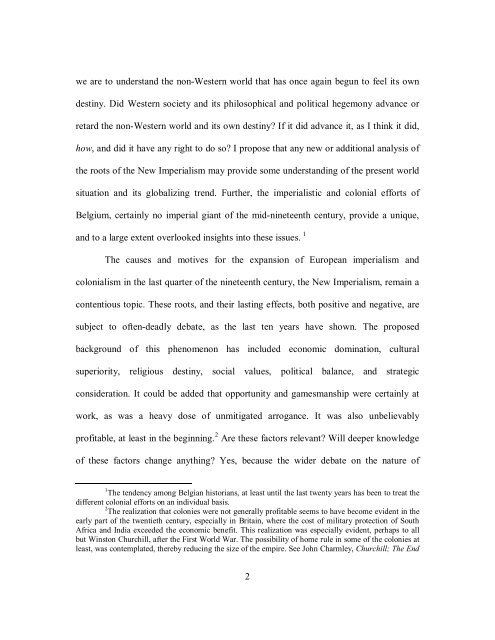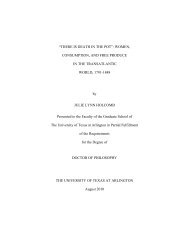EARLY BELGIAN COLONIAL EFFORTS - The University of Texas at ...
EARLY BELGIAN COLONIAL EFFORTS - The University of Texas at ...
EARLY BELGIAN COLONIAL EFFORTS - The University of Texas at ...
You also want an ePaper? Increase the reach of your titles
YUMPU automatically turns print PDFs into web optimized ePapers that Google loves.
we are to understand the non-Western world th<strong>at</strong> has once again begun to feel its own<br />
destiny. Did Western society and its philosophical and political hegemony advance or<br />
retard the non-Western world and its own destiny? If it did advance it, as I think it did,<br />
how, and did it have any right to do so? I propose th<strong>at</strong> any new or additional analysis <strong>of</strong><br />
the roots <strong>of</strong> the New Imperialism may provide some understanding <strong>of</strong> the present world<br />
situ<strong>at</strong>ion and its globalizing trend. Further, the imperialistic and colonial efforts <strong>of</strong><br />
Belgium, certainly no imperial giant <strong>of</strong> the mid-nineteenth century, provide a unique,<br />
and to a large extent overlooked insights into these issues. 1<br />
<strong>The</strong> causes and motives for the expansion <strong>of</strong> European imperialism and<br />
colonialism in the last quarter <strong>of</strong> the nineteenth century, the New Imperialism, remain a<br />
contentious topic. <strong>The</strong>se roots, and their lasting effects, both positive and neg<strong>at</strong>ive, are<br />
subject to <strong>of</strong>ten-deadly deb<strong>at</strong>e, as the last ten years have shown. <strong>The</strong> proposed<br />
background <strong>of</strong> this phenomenon has included economic domin<strong>at</strong>ion, cultural<br />
superiority, religious destiny, social values, political balance, and str<strong>at</strong>egic<br />
consider<strong>at</strong>ion. It could be added th<strong>at</strong> opportunity and gamesmanship were certainly <strong>at</strong><br />
work, as was a heavy dose <strong>of</strong> unmitig<strong>at</strong>ed arrogance. It was also unbelievably<br />
pr<strong>of</strong>itable, <strong>at</strong> least in the beginning. 2 Are these factors relevant? Will deeper knowledge<br />
<strong>of</strong> these factors change anything? Yes, because the wider deb<strong>at</strong>e on the n<strong>at</strong>ure <strong>of</strong><br />
1<br />
<strong>The</strong> tendency among Belgian historians, <strong>at</strong> least until the last twenty years has been to tre<strong>at</strong> the<br />
different colonial efforts on an individual basis.<br />
2<br />
<strong>The</strong> realiz<strong>at</strong>ion th<strong>at</strong> colonies were not generally pr<strong>of</strong>itable seems to have become evident in the<br />
early part <strong>of</strong> the twentieth century, especially in Britain, where the cost <strong>of</strong> military protection <strong>of</strong> South<br />
Africa and India exceeded the economic benefit. This realiz<strong>at</strong>ion was especially evident, perhaps to all<br />
but Winston Churchill, after the First World War. <strong>The</strong> possibility <strong>of</strong> home rule in some <strong>of</strong> the colonies <strong>at</strong><br />
least, was contempl<strong>at</strong>ed, thereby reducing the size <strong>of</strong> the empire. See John Charmley, Churchill; <strong>The</strong> End<br />
2
















